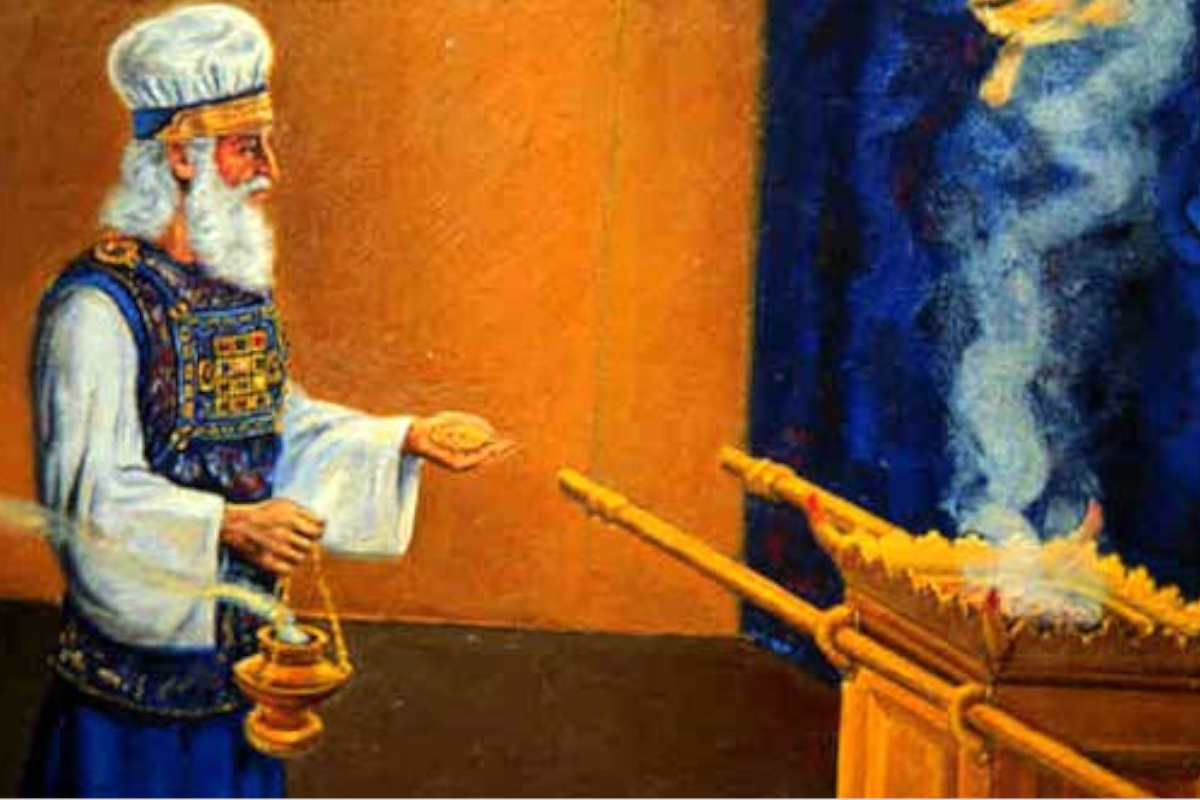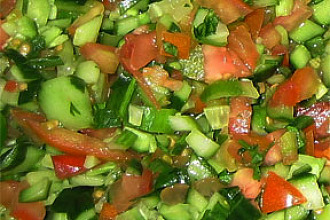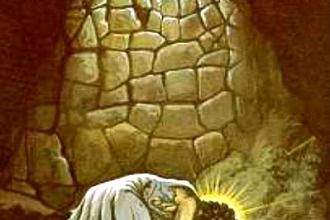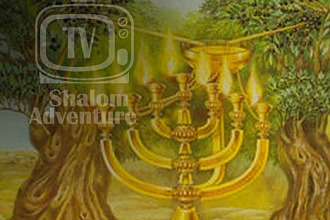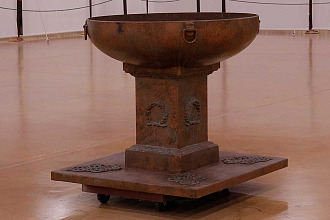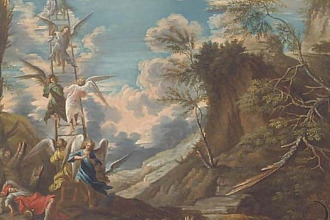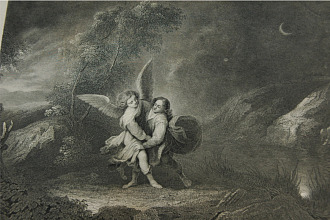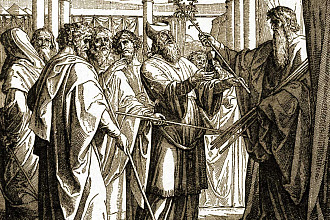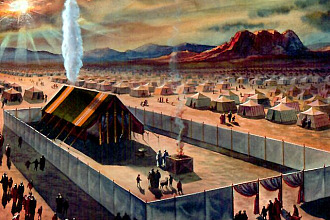Parasha for the Week: Nasso Numbers 4:21-7:89.
Haftarah for the Week: Judges 13:2 – 13:25.
Apostolic Writings: 2 Corinthians 13:14 – Ephesians 1:2 – 3.
Overview:
The Torah assigns the exact Mishkan-related tasks to be performed by the families of Gershon, Kehat, and Merari, the sons of Levi. A census reveals that over 8,000 men are ready for such service. All those ritually impure are to be sent out of the encampments.
If a person, after having sworn in court to the contrary, confesses that he wrongfully retained his neighbor’s property, he has to pay an additional fifth of the base-price of the object and bring a guilt offering as atonement. If the claimant has already passed away without heirs, the payments are made to a kohen.
In certain circumstances, a husband who suspects that his wife had been unfaithful brings her to the Temple. A kohen prepares a drink of water mixed with dust from the Temple floor and a special ink that was used for inscribing G-d’s Name on a piece of parchment. If she is innocent, the potion does not harm her; rather it brings a blessing of children. If she is guilty, she suffers a supernatural death.
A nazir is one who vows to dedicate himself to G-d for a specific period of time. He must abstain from all grape products, grow his hair and avoid contact with corpses. At the end of this period he shaves his head and brings special offerings.
The kohanim are commanded to bless the people.
The Mishkan is completed and dedicated on the first day of Nisan in the second year after the Exodus.
The prince of each tribe makes a communal gift to help transport the Mishkan, as well as donating identical individual gifts of gold, silver, animal and meal offerings.
“Who are the Cohanim?”
When the Torah is read in the synagogue on Shabbat, a member who bears the family name Cohen (a priest) is called to make the blessings over reading the first portion of the parasha. Then someone who bears the family name Levy (a levite) is called for the blessing over the second portion. And only after the Cohen and the Levite, a common Israelite is called for the remaining portion. To give the reading first to a Cohen is a great honor or precedence over a Levite or a common member of Israel. What do these titles mean and how did they come about?
Jewish history starts with our forefather, Abraham. His son Isaac continued the traditions and passed them on to his son, Jacob. Twelve sons were born to Jacob: Reuven, Shimon, Levi, Yehuda, Zevulon, Issachar, Dan, Gad, Asher, Naphtali, Joseph and Binyamin. These were the original 12 tribes of Israel. Because of a special blessing from Jacob to Joseph, his portion was given to his two sons, Ephraim and Menashe, who were then elevated to equal status with Yosef’s brothers—so there were really 13 tribes!
Until the transgression of the Golden Calf, the firstborn sons were the ones who were designated to do the holy service in the Mishkan—the Portable Sanctuary, in the Desert. According to the Jewish tradition, no one from the tribe of Levi worshiped the Golden Calf and, therefore, the Almighty replaced the firstborn with the tribe of Levi to serve in the sanctuary (Numbers 3:11-12). Levi had three sons: Gershon, Kehath and Merari. The work of the Sanctuary erecting, dismantling, carrying, singing, assisting the Cohanim was divided amongst the three families.
Moses and Aaron were brothers descended from Amram the son of Kehath. While Moses was the leader of the Jewish people in the desert, the Almighty designated Aaron as the Cohen Gadol (High Priest). For all time, Aaron and his descendants would be Cohanim. The Cohanim were the priests who performed the actual service in the Mishkan and later in the Temple in Jerusalem.
“Blessing is a Duty of the Priests”
In the text of the parasha for this week we have the Birkat Hacohanim, the priestly blessing. It is introduced saying: “The L-rd spoke to Moses, saying, ‘Speak to Aaron and his sons, saying, Thus you shall bless the people of Israel: you shall say to them’” (Numbers 6:22–23). It is the duty, part of the service of the priests to bless G-d’s people. This blessing does not emanate from the personal benevolence of the priests, rather it is part of their service in the Sanctuary.
The text continues with the Birkat HaKohanim “The L-RD said to Moses, ‘Tell Aaron and his sons, ‘This is how you are to bless the Israelites. Say to them: ‘The L-RD bless you and keep you; the L-RD make his face shine upon you and be gracious to you; the L-RD turn his face toward you and give you peace.’” (22-26). These blessings are said every day, in every synagogue all over the world. They are also incorporated in the Amida the morning standing prayer. These blessings are still given by the Kohanim, in the Kotel, (Western Wall) to bless the nation of Israel at the pilgrimage feasts: Pesach, Shavuot and Succoth.
These blessings did not come spontaneously to Moses but were instructed by G-d and they are composed of three blessings
- The L-RD bless you and keep you;
Yevarekhekha YHWH weyiśmerekha
- The L-RD make his face shine upon you and be gracious to you;
Yaer YHWH panaw eleykha weyikhunekha
- The L-RD turn his face toward you and give you peace.”’
Yiśa YHWH panaw eleykha weyasím lekha shálom
Each blessing has two components
• Bless you; Keep you
¥ His face upon you; Be gracious to you
¥ His face toward you; Give you peace
The first blessing promises us to be kept from the Hebrew word Shomer (protect, safeguard). G-d protect us from evil, to be protected when we are at home, at work or traveling, in every situation, we can trust G-d who keep us and protect us.
The second blessing promises that “G-d has his face upon us, He look at us with “grace” from the Hebrew word Khen which means with favor. The Hebrew concept of grace is a "free gift" from G-d for each one of us (something "free of charge" in modern Hebrew is Khinam). His grace is His forgiveness and His righteousness which are free, we acquire them by faith and not by work. It is a demonstration of His love as described in Exodus 34: “The L-rd, the L-rd, the compassionate and gracious G-d, slow to anger, abounding in love and faithfulness, maintaining love to thousands, and forgiving wickedness.” That is a gracious G-d.
The third blessing promises that when G-d turn His face toward us, we received His Shalom, His peace, because we are forgiven, we are consider as righteous, but more than anything else we feel the great “Shalom” in our heart. Only G-d can give this “Peace.”
Haftarah: Judges 13:2 – 25
In our text of the parasha, we have a long description of the Nazir: “The L-RD spoke to Moses, saying: …When either men or women make a special vow, the vow of a nazirite, to separate themselves to the L-RD, they shall separate themselves from wine and strong drink; they shall drink no wine vinegar or other vinegar, and shall not drink any grape juice or eat grapes, fresh or dried. … All the days of their nazirite vow no razor shall come upon the head; until the time is completed for which they separate themselves to the L-RD, they shall be holy…” (Numbers 6:2,3,6).
Our Haftara gives an example of a Nazir, who did not decide to be a Nazir but who has been chosen by G-d to be a Nazir. It is the story of Samson. The text of the Haftara is about the announcement of his birth. “the angel of the L-RD appeared to the woman and said to her, “Although you are barren, having borne no children, you shall conceive and bear a son. Now be careful not to drink wine or strong drink, or to eat anything unclean, for you shall conceive and bear a son. No razor is to come on his head, for the boy shall be a nazirite to G-d from birth” (Judges 13:3-5).
A beautiful story, because in fact it is not one of the angels of the L-rd who appeared to Samson’s mother, but the angel of the L-rd, that means THE very special angel who is very close to the L-rd. This angel appeared to Abraham before the destruction of Sodom and Gomorrah and in the text he is called in Hebrew “Adonai” (Genesis 18:1-3). This special angel was also the protector of Israel in the wilderness and had the power to forgive their sins (Exodus 23:20-22). This angel is called in the book of Daniel, Michael (Daniel 12:1) in Hebrew Mi-Ka-EL means the one “who (Mi) is like (Ka) G-d (EL)” and many theologians have seen in this angel the appearance of the Mashiach, the one who protects and saves Israel. “At that time Michael, the great prince, the protector of your people, shall arise… at that time your people shall be delivered, everyone who is found written in the book. Many of those who sleep in the dust of the earth shall awake, some to everlasting life, and some to shame and everlasting contempt. (Daniel 12:1,2).
Apostolic Writings: 2 Corinthians 13:14 – Ephesians 1:2 – 3
The parasha Nasso for this week gives us the Birkat Hakohanim, or priestly blessings. They are well known as it is also pronounced in our congregations.
These blessings are composed of three sentences, the L-rd is the subject of the three sentences and G-d’s actions are complementary one another.
- "The L-rd bless (Yevarechechah from Barach, to bless) you and keep (Yishmerecha from Shamar, to keep) you.
- The L-rd make (Yaer) his face to shine upon you and be gracious (Yichunechah from Chanan, grace) to you.
- The L-rd lift up (Ysah from Nasah) his countenance upon you and give you peace (shalom)" (Numbers 6:24-26)
However what is intriguing in these blessings is their numbers "three." I have the intuition that G-d is a "triune G-d."
The Messiah is presented as G-d for example in the book of Isaiah we read: “For to us a child is born, to us a son is given; and the government shall be upon his shoulder, and his name shall be called Wonderful Counselor, Mighty G-d, Everlasting Father, Prince of Peace.” (Isaiah 9:6).
And in many texts connected to G-d there is a connection with the number three. When Isaiah sees the throne of G-d he has an exclamation: “Holy, holy, holy is the L-rd of hosts; the whole earth is full of his glory!” (Isaiah 6:3). He pronounces three time the word “Holy” in Hebrew “Kadosh, Kadosh, Kadosh Adonai Tsevaoth.” Why? He could have the same intuition, or inspiration about a triune G-d. Today, in the Jewish synagogue, this affirmation of the holiness of the threefold G-d is repeated several times every day during the prayer time.
This same affirmation is pronounced in the last book of the Apostolic writing: “Holy, Holy, Holy, is the L-rd G-d Almighty, who was and is and is to come!” (Revelation 4:8). Three times the word “holy” for the threefold G-d, who is the L-rd, G-d the father who “was” known in the Hebrew Bible, who “is” this is the Holy Spirit who is acting currently in the church, and who “is to come” the Messiah is coming soon.
Indeed it is common in the Apostolic Writings to express G-d’s blessings in three sentences, Rabbi Shaul, as a Jew, ends his letters to the believers who lived in Corinth and in Ephesus with a threefold blessing, in the same tradition of the Hebrew Bible: In the letter to the Corinthians, these blessings are finishing the letter, he said:
- The grace (Hesed) of the L-rd Yeshua Mashiach
- The love (Ha’avah) of G-d and
- The fellowship (Chaverut) of the Holy Spirit be with you all. (2 Corinthians. 13:14).
And we have another expression of a threefold blessing in the letter to the Ephesians, but rabbi Shaul here starts his letter saying:
- Grace (Chesed) to you and peace (Shalom) from G-d our Father and the L-rd Yeshua Mashiach.
- Blessed (Baruch) be the G-d and Father of our L-rd Yeshua Mashiach, who has blessed (Berech) us in Mashiach with every
- Spiritual blessing (B’racha Ruchanit) in the heavenly places (Ephesians 1:2-3).
Chesed and Shalom, bracha and makom beshamayim, Hebrew words which key words in the Tanach. The Apostolic Writings reveal the same truth, the triune G-d of the Bible is a G-d who wants to bless us. It is our privilege to accept it.
If we come back to the Birkat Hakohanim, given in the book of Numbers (6:24-26) at the light of what we learn from the Apostolic Writings, we can interpret these blessings through the triune G-d:
- "The L-rd bless you and keep you." This blessing is coming from G-d the father. It is the G-d the father who blesses and who keeps his children.
- "The L-rd make his face to shine upon you and be gracious to you." The Apostolic Writings help up to discover the gracious and loving Messiah Yeshua, he is the one who make his face to shine upon us, and his gracious favor for us is clearly demonstrated by the gift of his life to save us.
- "The L-rd lift up his countenance upon you and give you peace" it is "peace" in our heart, which can be given by the Holy Spirit. These three blessings are clearly blessings from our threefold G-d.
When the believer is in doubt about his life, he turns his eyes to the L-rd: “I lift up my eyes to the hills. From where does my help come? My help comes from the L-RD, who made heaven and earth.” (Psalms 121:1–2), and then this same text gives us a new version of the birkat Hakohanim: “He will not let your foot be moved; he who keeps you will not slumber. Behold, he who keeps Israel will neither slumber nor sleep. The L-RD is your keeper; the L-RD is your shade on your right hand. The sun shall not strike you by day, nor the moon by night. The L-RD will keep you from all evil; he will keep your life. The L-RD will keep your going out and your coming in from this time forth and forevermore.” (Psalms 121:3–8)

